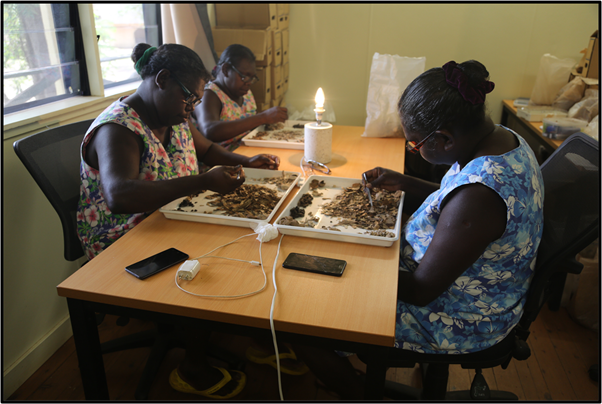Research Centre for Deep History visiting fellow Professor Annie Clarke presented her seminar on the Groote Eylandt Archaeology Repatriation Project to the School of History on 14 October. Having conducted extensive archaeological research in partnership with Anindilyakwa community-members in the 1990s, Annie returned in 2018 to repatriate archaeological material as well photographs of the research where she met me. I was also returning historical materials and publications related to Groote Eylandt at this time. The archaeological material is now housed on Groote Eylandt. During this latest visit, Annie employed community co-researchers to continue work on the repatriated samples which had not yet been fully analysed.
This work is an example of ‘slow’ practice in archaeology. It has become an intergenerational project with daughters of the old man who had conducted research in the 1990s now employed to continue the research. Archaeological analysis was conducted on Country rather than on university campuses such that the community’s participation in and ownership of the research could continue.
There are unanticipated cultural benefits of conducting research in this way. Archaeological findings function as mnemonic devices to generate conversations about culture. For example, findings of a diverse range of shell species became a prompt for broader discussions about Indigenous lifeways, cultural changes and knowledge revitalisation. Visiting important rock-art sites with community members enabled people to share old stories of Macassan visits. Likewise, the photographs of family conducting archaeological research in the 1990s became exceptionally valuable. They prompted discussions around memory, history and culture and became an unexpected archive of this more recent history.
Annie’s research practice reveals the riches of slow, community-based research. It presents a challenge to academic practice which might often be focused on fast and tangible outputs and outcomes. An intergenerational and community-based practice, on the other hand, offers exciting and often unexpected cultural benefits to communities as they use research in ways most suited to them.



